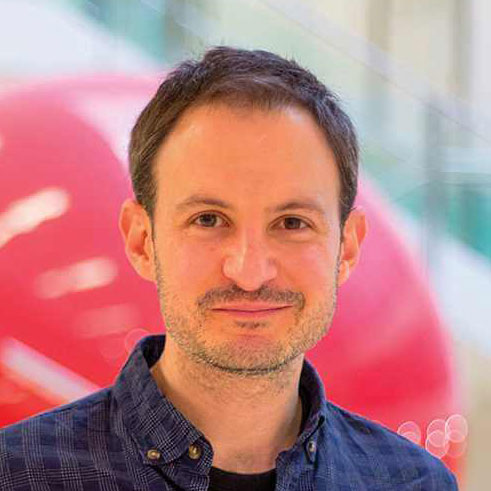I_Menstruate Movement
Building a movement to eradicate period poverty in South Africa

The Spark
(K)new Solution in Health Equity and Advocacy
By combining movement building, awareness raising, advocacy, education and direct provision of services, the Fellows have gathered information on the lived experience of period poverty. They are building young women and girls’ knowledge of the politics surrounding menstruation, enabling the telling of their stories, and using collective power to change public policy concerning access to menstrual hygiene products. The I_Menstruate movement is helping to change the conversation around menstruation. It has called on the government and other decision makers to provide free menstrual hygiene products for all and its ultimate aim is to end period poverty in South Africa.

Period poverty affects the poorest young women and girls in South Africa, with a third of all girls unable to afford hygiene products.
It has been estimated that as many as 7 million girls of school going age in South Africa lack access to menstrual hygiene products. I_Menstruate, the initiative Tracey and Joey set up with the support of an Atlantic Institute Ideate Grant, interviewed 541 girls from 18 schools from some of South Africa’s poorest schools and found 83% of respondents did not have regular access to menstrual hygiene products. A quarter of respondents reported missing classes due to their periods, and 78% reported not knowing about menstruation at the time of their first period.

The Initiatives
The I_Menstruate movement is supporting and engaging young women and girls in South Africa to understand the dynamics of period poverty.
Tracey and Joey worked with pupils and teachers from 18 schools across South Africa to understand how learners manage their periods at school and at home, and to gather information on access to menstrual hygiene products and provision of menstrual education. Awareness raising at the schools and within their wider communities was aided by learners, including boys, creating artwork about period poverty. T-shirts were produced and worn by learners, and also male school caretakers who wanted to show their solidarity with those who are affected.

This was followed by a launch event to begin a major campaign for the eradication of period poverty, which included a silent protest and a call for the government to make menstrual hygiene products free to all. The private sector was called upon to support efforts to make menstrual products accessible to all, and to end the stigma associated with menstruation.
The Fellows and other activists have also engaged with the media and social media to spark a conversation on menstruation and also to call for free menstrual hygiene products for all. The social media pages, especially Facebook, are also being used to assist girls with their menstrual periods. Questions are referred to ‘Dr Gynae’ (Dr Mpume Zenda the founder of WeSeeYou) and girls are also encouraged to go to the nearest health facility. In addition they have been able to distribute free sanitary pads via schools.


The Scale
(K)new Solution & Advocacy – With the support of a Ideate Grant, Tracey and Joey were able to mobilize the local community to begin education and increase access to menstrual products. They heavily relied on (k)new solutions already found in local contexts to inform how they supported students and caregivers on the topic. Most importantly, in their advocacy and solution building, they worked to reduce stigma surrounding conversations about menstruation, providing spaces for students to talk openly about their experiences.

With more than 18 schools, 540 students, and a global hashtag, Tracey and Joey are advocating for the end of Period Poverty.
The immediate outcomes from this project include:
- The I_Menstruate movement has been formed (and registered as an NPO) to help eradicate period poverty in South Africa. All 18 schools who worked with the Fellows on this project (and all 541 learners) have become part of this movement.
- Produced a grassroot research report titled Bleeding in Silence: Barriers to Menstrual
Hygiene amongst School Girls in South Africa.
- Through direct work with schools, allowing girls to share their experiences, the stigma of menstruation has been reduced by bringing these conversations out into the open and also involving boys. Also, teachers have been empowered to call for more help with this issue and with gaining access to menstrual hygiene products for their learners.
- The hashtags #I_Menstruate and #PeriodPovertyEndsWithMe have been established to spark a conversation on menstruation and also to call for free menstrual hygiene products for all.
- A media database of 50+ journalists has been established to help disseminate the movement's aims and further raise awareness of period poverty.
- The work of I_Menstruate has been introduced to 50+ organizations who are part of civil society as well as 5+ government departments who are instrumental to the movement’s aims.

The Future
Tracey and Joey are continuing to explore new methods of advocacy and education since receiving the Ideate grant. Specific steps taken include a comprehensive costing report with Health Economics and Epidemiology Research Office released in August 2024 alongside a 1 Million Signatures movement to endorse the important research.

Media Mentions
The Initiative is working on releasing the Holistic Safety Education course and offering training on using HoSAI as a tool to improve the safety of girls and frontline defenders working with them.






.jpeg)

